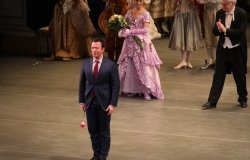Women’s Top-Level Political Participation in Ukraine: Challenges and Opportunities
“Ukrainians’ record on women’s inclusion in politics is indefensible,” said Tamara Martsenyuk, Chopivsky Post-Doctoral Fellow, CREEES, Stanford University, and Associate Professor, Department of Sociology, National University of Kyiv-Mohyla Academy, at a 21 May 2012 Kennan Institute event. During the twenty years since Ukrainian independence, women have held less than ten percent of the seats in political office in Ukraine. Yet, women constitute forty five percent of the management force in the civil service sector, albeit mainly at the local level.
Overview
Cosponsored bytheCenter for Russian, East European and Eurasian Studies (CREEES), Stanford University
“Ukrainians’ record on women’s inclusion in politics is indefensible,” said Tamara Martsenyuk, Chopivsky Post-Doctoral Fellow, CREEES, Stanford University, and Associate Professor, Department of Sociology, National University of Kyiv-Mohyla Academy, at a 21 May 2012 Kennan Institute event. During the twenty years since Ukrainian independence, women have held less than ten percent of the seats in political office in Ukraine. Yet, women constitute forty five percent of the management force in the civil service sector, albeit mainly at the local level. Gender discrimination against women in the political sphere and women’s lack of access to power is prevalent in Ukraine, said Martsenyuk. Despite Ukraine’s record as the first post-Soviet country to implement laws against human trafficking, domestic violence, and gender legislation, women are underrepresented in the political sphere.
Ukraine continues to conduct international projects supporting gender equality, yet according to the World Economic Forum Global Gender Gap report Ukraine places low on the list of countries promoting political and gender equality for women. According to Martsenyuk, very little is implemented either legislatively or programmatically in terms of tangible policies regarding women. “There is a lack of government accountability and lack of sanctions for violation of legislation,” said Martsenyuk.
Stereotypes of gender roles play an important part in limiting women’s participation in politics. There are six hundred professions forbidden for women in Ukraine. Martsenyuk reported that general public opinion in Ukraine supports the notion that women belong in a domestic environment—in the home, raising children, etc. According to the results of a Ukrainian public opinion survey, “Men are viewed as better suited for politics than most women.” Martsenyuk speculated that the results of some surveys could be explained in part by the type of questions asked, which may have been formulated to solicit specific pro-male responses. Women in Ukraine are eager to support the idea of stronger presence of women in political office, but the double burden of balancing domestic demands with working outside the home proves problematic for Ukrainian women.
High ranking officials have made public speeches in which women were called beautiful commodities to be seen, to inspire politicians, but not to hold public office. Recently Ukraine’s president delivered a speech encouraging foreign nationals to visit Ukraine for the purposes of viewing its beautiful women. Media and commercial advertisements contribute to the stereotype that Ukrainian women should be objectified as commodities and in such an environment, observed Martsenyuk, “It is hard to imagine other roles for women.”
Ukrainian political parties have differing attitudes regarding the inclusion of women in politics, especially at the top levels of power, according to Martsenyuk. The differences can be studied by comparing party programs and party lists. The most popular Ukrainian political parties often lack female leaders and do not address key gender equality issues in their party programs. Political parties make little effort to engage women into their organizational structure. Martsenyuk contended that Ukraine’s political parties make it clear that women’s issues are considered secondary to Ukrainian political stability and economic prosperity.
Yulia Tymoshenko is the most well-known Ukrainian woman politician and was listed third on Forbes’ most powerful women in 2005, according to Matsenyuk. She is an important figure to promote empowerment of women in Ukrainian politics given that she is a self-made woman of power. Yet politicians in Ukraine use Tymoshenko’s success as an argument against affirmative action laws that help women, asserting that her rise to power in the Ukrainian political arena precludes the need for special legislation.
Martsenyuk suggested that in order for the issues of women in politics to be less controversial, a younger generation must become involved and female leaders should launch more programs for women in order to raise their interest in politics. She also stated that entry points for woman activists striving to make change should start at the community based levels and that involving the day to day people will build better awareness. Martsenyuk stressed that certain words common to promoting women’s rights, such as “gender” and “feminist,” are politically poisonous in Ukraine. Ukrainians are supportive of the principle of equality for women as long as specific legislation or policy is framed without feminist terms.
By Thea Cooke
Blair Ruble, Director, Kennan Institute
The Kennan Institute speaker series is made possible through the generous support of the Title VIII Program of the U.S. Department of State.
Speaker
Tamara Martsenyuk
Hosted By

Kennan Institute
The Kennan Institute is the premier US center for advanced research on Russia and Eurasia and the oldest and largest regional program at the Woodrow Wilson International Center for Scholars. The Kennan Institute is committed to improving American understanding of Russia, Ukraine, Central Asia, the Caucasus, and the surrounding region though research and exchange. Read more
Thank you for your interest in this event. Please send any feedback or questions to our Events staff.










